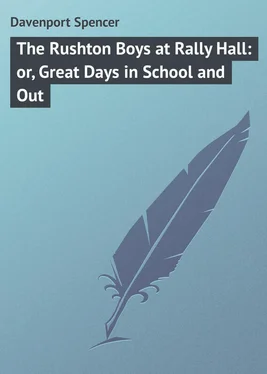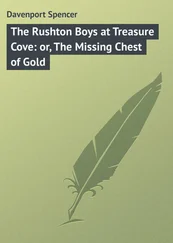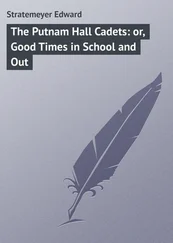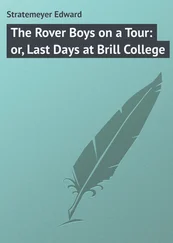Spencer Davenport - The Rushton Boys at Rally Hall - or, Great Days in School and Out
Здесь есть возможность читать онлайн «Spencer Davenport - The Rushton Boys at Rally Hall - or, Great Days in School and Out» — ознакомительный отрывок электронной книги совершенно бесплатно, а после прочтения отрывка купить полную версию. В некоторых случаях можно слушать аудио, скачать через торрент в формате fb2 и присутствует краткое содержание. Жанр: foreign_prose, foreign_children, на английском языке. Описание произведения, (предисловие) а так же отзывы посетителей доступны на портале библиотеки ЛибКат.
- Название:The Rushton Boys at Rally Hall: or, Great Days in School and Out
- Автор:
- Жанр:
- Год:неизвестен
- ISBN:нет данных
- Рейтинг книги:4 / 5. Голосов: 1
-
Избранное:Добавить в избранное
- Отзывы:
-
Ваша оценка:
- 80
- 1
- 2
- 3
- 4
- 5
The Rushton Boys at Rally Hall: or, Great Days in School and Out: краткое содержание, описание и аннотация
Предлагаем к чтению аннотацию, описание, краткое содержание или предисловие (зависит от того, что написал сам автор книги «The Rushton Boys at Rally Hall: or, Great Days in School and Out»). Если вы не нашли необходимую информацию о книге — напишите в комментариях, мы постараемся отыскать её.
The Rushton Boys at Rally Hall: or, Great Days in School and Out — читать онлайн ознакомительный отрывок
Ниже представлен текст книги, разбитый по страницам. Система сохранения места последней прочитанной страницы, позволяет с удобством читать онлайн бесплатно книгу «The Rushton Boys at Rally Hall: or, Great Days in School and Out», без необходимости каждый раз заново искать на чём Вы остановились. Поставьте закладку, и сможете в любой момент перейти на страницу, на которой закончили чтение.
Интервал:
Закладка:
Spencer Davenport
The Rushton Boys at Rally Hall; Or, Great Days in School and Out
CHAPTER I
A RASH IMPULSE
“Get back, Jim. It’s over your head.”
The ball had left the bat with a ringing crack that made it soar high into the air toward left field.
Jim Dabney, who was playing left, made a hard run for it, but stumbled over a clump of grass, and the ball just touched the end of his fingers.
“Wow!” he yelled, wringing his hand, “there’s another nail gone.”
“Never mind your hand, Jim!” yelled the second baseman. “Put it in here. Quick!”
Fred Rushton, who had hit the ball, was streaking it for second, and Jim, forgetting his injured hand, picked up the ball and threw it in. Fred saw that it was going to be a tight squeeze and made a slide for the base. The ball got there at almost the same time, and for a moment there was a flying tangle of arms and legs. Then Fred rose to his feet and brushed the dust from his clothes.
“Never touched me,” he remarked, with a slight grin.
“No,” agreed Tom Benton, the second baseman. “It was a pretty close call though.”
He threw the ball to the pitcher and Fred danced about between second and third.
“Bring me in now, Jack!” he shouted to Jack Youmans, the batter. “Hit it right on the trademark.”
Jack made a savage swing but met only the empty air.
“Never mind, Jack,” called Fred cheerfully. “Better luck next time. What did I tell you?” he added, as the ball, meeting the bat squarely, went whizzing past just inside third.
Jim Dabney, who was playing close up, made a clever pick-up and threw it straight as a die for home. Fred had passed third and was legging it for the plate with all his might. But this time the ball had a shade the better of it, and Fred was nabbed just as he slid over the rubber.
“Good try, old boy, but you just didn’t make it,” cried Bob Ellis, the catcher, as he clapped the ball on him.
“Sure thing,” admitted Fred, “but it was worth taking a chance.”
There were three out, and the other side came in for its inning. Jim Dabney was all smiles, as he came over to Fred.
“How was that for a throw, Fred?” he asked. “Pretty nifty, I call it.”
“It was a peach,” assented Fred. “You got me good and proper and I’m not saying a word. That wing of yours is certainly all right. How’s the hand? Did you hurt it badly?”
“Only started another nail,” answered Jim. “I suppose that will turn black now and begin to come off. That’ll make the third I’ve lost this year. Lucky it was on the left hand, though.”
“Cheer up, Jim,” laughed Bob, “you’ve got seven nails left.”
But, obviously, Jim did not need cheering up. His good-natured face was aglow with satisfaction. He had made a good stop and had thrown his man out at the plate. Then, too, he rather gloated over his scars in secret, and would exhibit them on occasion with all the pride of a soldier showing his wounds received in battle. They were so many proofs of his prowess on the diamond.
It would be straining a point, perhaps, to call the field on which the boys were playing a “diamond.” At the best it was a “diamond in the rough.” Half a mile away, on the other side of the village of Oldtown, there was a real baseball field, well laid out and kept in good condition. There was a fine turf infield, a spacious and closely cut outfield and the base lines were clearly marked. The townspeople took considerable pride in the grounds, that were much above the average for villages of that size, and, on Saturday afternoons, almost the whole male population of the town was to be found watching the game and “rooting” for the home team.
But on this day the boys were practicing on a lot directly behind the home of Fred Rushton, who was the captain of their school nine. Big stones marked the position of the bases, and the “rubber” at the home plate was a sheet of tin. Although the infield was fairly smooth, the lot further out was rough and clumpy, and it was risky work running for high flies, as Jim had proved to his cost. But it was good practice, and the enthusiasm and high spirits of the boys made up for all defects in the playing field. It is safe to say that no highly paid athlete, prancing over the velvet sward of major league grounds, got so much real fun out of the game as these lads with their makeshift diamond.
Most of the boys playing were members of the Oldtown school team, but enough others had been picked up to make a scrub game of seven on a side. Two players had to cover the whole outfield, and each side was minus a shortstop. Even with this handicap, the game had been a good one, and, after one more inning had been played, Fred’s side had come out two runs ahead. It was getting late in the afternoon, and the boys, flushed and dusty, had begun to draw on their coats.
“Oh, don’t go yet, fellows,” urged Teddy Rushton, Fred’s younger brother. “I haven’t had half enough baseball yet. I’m as full of pep as when I began.”
“Oh, come off,” retorted Bob Ellis. “Don’t you see where the sun is? It’s getting near supper time. It’s too late to start another game.”
“Who said anything about another game?” replied Teddy. “I’m going to do some fungo hitting. Get out there, you fellows, and I’ll knock you some flies. Go along, Jim, and I’ll take off another nail.”
“You’d better not,” grinned Jim, but scampered out just the same, followed by three or four others, whose appetite for the game, like Teddy’s own, had not been fully satisfied.
Teddy had a keen eye and a good arm, and there were few boys of his age who could hit the ball harder or send it further. Usually, too, he could gauge the distance and knock a fly so that it would fall almost in the fielder’s hands. But to-day the ball seemed to take a perverse delight in falling either too short or too far out, and the boys were kept on the run, with only an occasional catch to reward their efforts.
“Have a heart, Teddy!” shouted Jim, red and perspiring. “Put ’em where a fellow can get ’em.”
“Get a move on, why don’t you?” called Teddy in return. “I can’t help it if you run like ice wagons. I hit them all right.”
“Hit!” snorted Jim wrathfully. “You couldn’t hit the water, if you fell overboard.”
A little nettled by the taunt, Teddy looked about him. He caught sight of a stage, drawn by two horses, jogging along the road that ran beside the field. A glint of mischief came into his eyes and he gripped his bat tightly. Here was a chance to prove that Jim was wrong.
The stage coach was coming from the railroad station at Carlette, a mile away, where it had been to meet the five-thirty P. M. train. Business had not been very brisk, judging from the fact that the ramshackle old vehicle carried only one passenger, a rather elderly man dressed in black, who sat on one of the side seats with his back toward the boys. A bag of mail was on the front seat alongside the driver, a lank, slab-sided individual, in a linen duster that had evidently seen better days. He held the reins listlessly over the horses, who moved slowly along, as though they were half asleep. Coach and horses and driver were so dead and alive, so Rip Van Winkle-like, that the temptation was almost irresistible to stir them up, to wake them out of their dream. To Teddy, with his native love of mischief, it proved wholly irresistible.
“Can’t hit anything, eh?” he yelled to Jim. “Just watch me.”
He took careful aim, caught the ball full on the end of the bat and sent it straight as a bullet toward the coach. Even as he swung, he heard the startled cry of his brother:
“Don’t, Teddy, don’t!”
Читать дальшеИнтервал:
Закладка:
Похожие книги на «The Rushton Boys at Rally Hall: or, Great Days in School and Out»
Представляем Вашему вниманию похожие книги на «The Rushton Boys at Rally Hall: or, Great Days in School and Out» списком для выбора. Мы отобрали схожую по названию и смыслу литературу в надежде предоставить читателям больше вариантов отыскать новые, интересные, ещё непрочитанные произведения.
Обсуждение, отзывы о книге «The Rushton Boys at Rally Hall: or, Great Days in School and Out» и просто собственные мнения читателей. Оставьте ваши комментарии, напишите, что Вы думаете о произведении, его смысле или главных героях. Укажите что конкретно понравилось, а что нет, и почему Вы так считаете.












